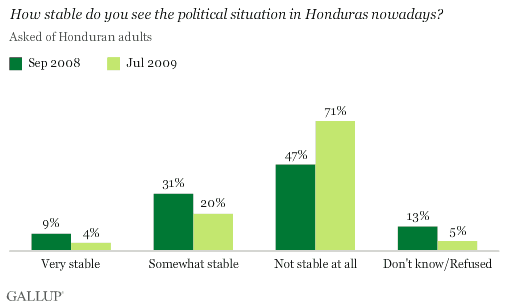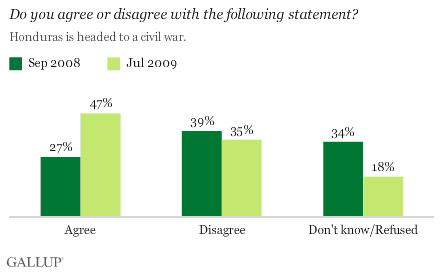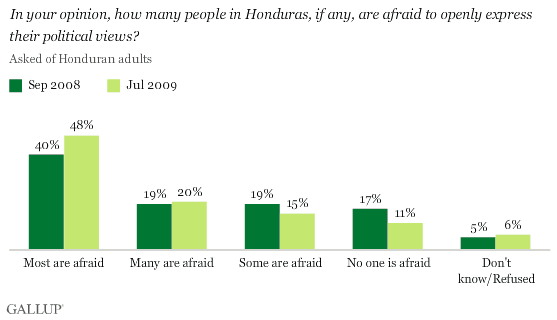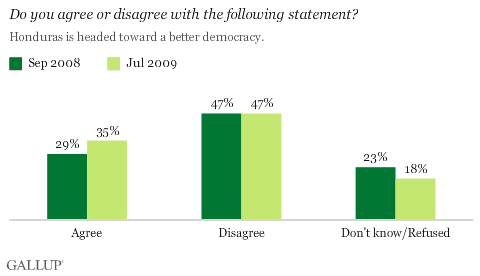WASHINGTON, D.C. -- The four-month-old political crisis in Honduras may be approaching resolution as deposed Honduran President Manuel Zelaya and interim leader Roberto Micheletti agreed Friday to share political powers. However, the leaders have their work cut out for them. Gallup surveyed Hondurans in July, days after troops deposed Zelaya from office, and found 71% of Hondurans saying the political situation in their country is not stable at all, up from 47% in 2008.

Nearly half of Hondurans (47%) also agreed their country was at the time headed toward a civil war, up 20 percentage points from 27% in 2008.

On June 28, Honduran troops -- under orders from the Supreme Court -- deposed Zelaya for supporting a referendum to change the constitution. Micheletti, then speaker of Congress, assumed interim leadership. No government in the Americas recognized the Micheletti government, and because Micheletti had repeatedly refused multilateral mediation, some nations -- including the United States -- threatened to withhold foreign aid.
U.S. Secretary of State Hillary Clinton recently stepped up U.S. involvement in the negotiations by ordering three senior diplomatic officials to Honduras to help settle the crisis. Shortly thereafter, both sides announced an end to the deadlock.
Attitudes Toward Political Expression as Election Approaches
In the wake of the coup, Gallup also found Hondurans more likely to say people are afraid to express their political views. In July, nearly half of Honduran respondents (48%) said most people are afraid to express their political views. This is up from 40% who said so in 2008. Further, 11% said no one is afraid to express their views, down from 17% in 2008.

The rioting in Tegucigalpa that immediately followed the coup, and the deaths that resulted from police intervention, could have contributed to the change in opinions.
All Eyes on November's Election
Friday's power-sharing agreement will require both sides to recognize the outcome of the presidential election, set for Nov. 29.At the time of the poll, slightly more than one in four Hondurans (28%) said they have confidence in the honestly of elections, essentially unchanged from 25% who said so in 2008. Roughly half of respondents (47%) disagreed when asked if their country is headed toward a better democracy -- unchanged since 2008. More than one in three (35%) did see a better democracy ahead, up slightly from 29% in 2008.

Results from a recent Cid-Gallup survey show that 75% of Hondurans believe the November election would resolve the crisis, while 73% said that things would get worse without an election. While Friday's power-sharing agreement provides hope for more political stability, the November election will be a critical test. How fairly and efficiently Micheletti, Zelaya, Honduran citizens, and foreign nations handle the election will likely determine the near-term course of a nation where nearly half of its citizens just a few months ago saw instability and predicted civil war.
For complete methodology and specific survey dates, please review Gallup's Country Data Set details.
Survey Methods
Results are based on face-to-face interviews with at least 1,000 adults, aged 15 and older, conducted in Aug. 24-Sept. 7, 2008, and July 11-25, 2009, in Honduras. For results based on the total sample of national adults, one can say with 95% confidence that the maximum margin of sampling error is ±3.3 percentage points for both data collection periods. The margin of error reflects the influence of data weighting. In addition to sampling error, question wording and practical difficulties in conducting surveys can introduce error or bias into the findings of public opinion polls.
